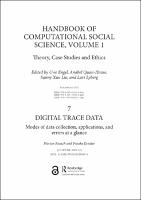Chapter 7 Digital Trace Data
Modes of data collection, applications, and errors at a glance
| dc.contributor.author | Keusch, Florian | |
| dc.contributor.author | Kreuter, Frauke | |
| dc.date.accessioned | 2021-11-11T11:03:38Z | |
| dc.date.available | 2021-11-11T11:03:38Z | |
| dc.date.issued | 2021 | |
| dc.identifier.uri | https://library.oapen.org/handle/20.500.12657/51412 | |
| dc.description.abstract | "The Handbook of Computational Social Science is a comprehensive reference source for scholars across multiple disciplines. It outlines key debates in the field, showcasing novel statistical modeling and machine learning methods, and draws from specific case studies to demonstrate the opportunities and challenges in CSS approaches. The Handbook is divided into two volumes written by outstanding, internationally renowned scholars in the field. This first volume focuses on the scope of computational social science, ethics, and case studies. It covers a range of key issues, including open science, formal modeling, and the social and behavioral sciences. This volume explores major debates, introduces digital trace data, reviews the changing survey landscape, and presents novel examples of computational social science research on sensing social interaction, social robots, bots, sentiment, manipulation, and extremism in social media. The volume not only makes major contributions to the consolidation of this growing research field, but also encourages growth into new directions. With its broad coverage of perspectives (theoretical, methodological, computational), international scope, and interdisciplinary approach, this important resource is integral reading for advanced undergraduates, postgraduates and researchers engaging with computational methods across the social sciences, as well as those within the scientific and engineering sectors." | en_US |
| dc.language | English | en_US |
| dc.subject.classification | thema EDItEUR::J Society and Social Sciences::JM Psychology | en_US |
| dc.subject.classification | thema EDItEUR::J Society and Social Sciences::JM Psychology::JMB Psychological methodology | en_US |
| dc.subject.other | AI, big data, data analysis, data archives, data ownership, data science, digital trace, ethical standards, ethics, human-robot interaction, information technology, machine learning, open data, politics, policy, quantitative, replication, social, social media, socio-robots, survey data, survey design, survey methodology, unstructured data | en_US |
| dc.title | Chapter 7 Digital Trace Data | en_US |
| dc.title.alternative | Modes of data collection, applications, and errors at a glance | en_US |
| dc.type | chapter | |
| oapen.identifier.doi | 10.4324/9781003024583-8 | en_US |
| oapen.relation.isPublishedBy | 7b3c7b10-5b1e-40b3-860e-c6dd5197f0bb | en_US |
| oapen.relation.isPartOfBook | 3b8c3127-84ee-411d-803a-d657dc2cad84 | en_US |
| oapen.relation.isbn | 9780367456535 | en_US |
| oapen.relation.isbn | 9780367456528 | en_US |
| oapen.imprint | Routledge | en_US |
| oapen.pages | 20 | en_US |
| peerreview.anonymity | Single-anonymised | |
| peerreview.id | bc80075c-96cc-4740-a9f3-a234bc2598f1 | |
| peerreview.open.review | No | |
| peerreview.publish.responsibility | Publisher | |
| peerreview.review.stage | Pre-publication | |
| peerreview.review.type | Proposal | |
| peerreview.reviewer.type | Internal editor | |
| peerreview.reviewer.type | External peer reviewer | |
| peerreview.title | Proposal review | |
| oapen.review.comments | Taylor & Francis open access titles are reviewed as a minimum at proposal stage by at least two external peer reviewers and an internal editor (additional reviews may be sought and additional content reviewed as required). |

